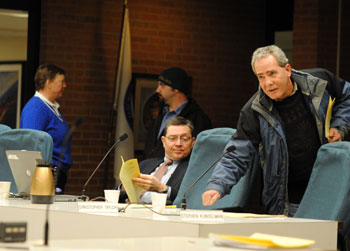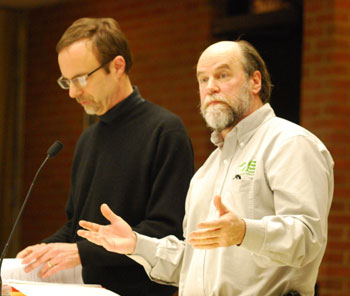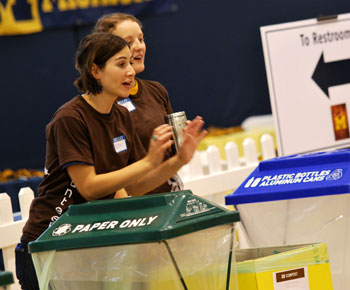Buckets of compost for sale in front of Zingerman’s Deli, $5 each. [photo]
Stories indexed with the term ‘compost’
Fountain & Cherry
The snow is as high as a composter’s eye (well, a small composter). [photo]
Ann Arbor Council Focuses on Land Issues
Ann Arbor City Council meeting (Dec. 6, 2010): Five different presentations, plus a full roster of public commentary, meant that two and a half hours into their meeting the Ann Arbor city council had not transacted any business – except for adopting its rules for the next year.

Before the meeting started, Scott Rosencrans, right, knocks on wood in conversation with Stephen Rapundalo (Ward 2). Behind them are Sandi Smith (Ward 1) and Nicholas Nightwine, president of the city's AFSCME union Local 369. Nightwine was there to oppose the outsourcing of city composting operations. Rosencrans, former chair of the park advisory commission, attended as part of a presentation made by the Ann Arbor Skatepark. (Photos by the writer.)
Council rules factored prominently later in the meeting, when a motion to suspend them failed. Had the rules been suspended, it would have cleared the way for the council to reconsider their previous decision to reject a residential planned unit development (PUD) on Fifth Avenue – Heritage Row. The project, which began as a conditional rezoning proposal three years ago, went through iterations since 2007 that included a brownstone-style PUD and a matter-of-right proposal called City Place, which eventually did win approval from the council.
After their previous council meeting, which featured water as a prominent theme, the council focused much of its attention on land-related issues like Heritage Row. In another land-use related item, the council approved revisions to the city’s area, height and placement (AHP) zoning provisions in the city code. But amendments to the AHP resolution were substantive enough that the approval process was reset to the initial, first-reading step. The AHP changes – which, as amended, provide that height limits do not apply in so-called “employment districts,” unless they abut residential areas – will need approval at a second reading in order to be enacted.
A land-use item that was intended mostly as administrative housekeeping – several park areas previously designated as residential, office, and business districts were rezoned with the public land (PL) designation – generated substantial public commentary and council deliberations. Several public commenters expressed concern about whether the PL designations, which the council approved, afforded adequate protection for the continued use of the land as parks.
Although not strictly a land-use issue in a zoning sense, a proposed contract with WeCare Organics to operate the city’s compost facility was linked to terra firma by acreage owned by the city where the facility is located, plus the fact that it processes yard waste generated from residents’ property. The council approved the WeCare contract after extended questioning of city staff and a representative from WeCare.
Also tangentially related to land use was an item that introduced a licensing scheme for medical marijuana dispensaries and cultivation facilities in the city. After questioning the city attorney about several provisions of his proposed licensing requirements, councilmembers decided to postpone the issue until their Jan. 3, 2011 meeting. The new zoning regulations regarding where medical marijuana dispensaries and cultivation facilities can be located, which were scheduled to be heard at second reading on Dec. 20, were rescheduled for Jan. 18.
A land travel-related agenda item the adoption of the Michigan Vehicle Code (MVC) as part of the city’s traffic ordinances. Two years ago, the city had adopted the MVC but excluded portions of that state law relating to the setting of speed limits. The adoption of the full MVC came in response to a possible class-action lawsuit against the city.
As heavily land-centric as the agenda was, Ann Arbor city council also dealt with $9 million worth of water issues. It approved petitions of the Washtenaw County Water Resources Commissioner (WCWRC) office for five different projects in drainage districts that lie at least partly inside the city of Ann Arbor. The total cost of all the projects, including the non-city share, is a bit over $9 million. They qualify for low-interest state-revolving fund loans, up to 50% of which may be forgiven by the state. The payments on the loans will come from the city’s stormwater fund. [Full Story]
Council Banks on Single-Stream Recycling
Ann Arbor City Council meeting (March 15, 2010) Part 2: Part 1 of the meeting report handles the range of various topics at the meeting that did not fall into the general category of recycling. Part 2 focuses specifically on the two recycling-related resolutions approved by the council.

Tom McMurtrie, left, is the city's solid waste coordinator. Jim Frey, right, is CEO of Resource Recycling Systems, a consultant for the city on recycling.
The two separate resolutions correspond to the two facets of the new recycling system for Ann Arbor, which will be deployed in July 2010.
One resolution revised the contract with Recycle Ann Arbor (RAA) for curbside recycling pickup to reflect the single-stream character of the system. Residents will no longer place paper and containers in separate 11-gallon stackable totes to be hand-emptied by RAA drivers. Instead, residents will put all their recyclable materials into a single rollable cart with a lid. Drivers will operate a robot arm from inside the truck to lift and tip the single cart’s recyclable contents into the truck.
The other resolution approved by the council authorized a contract with RecycleBank to implement an incentive program for residents, based on their participation in the recycling program and the average amount of materials recycled on their route.
Both the conversion to the new system and its associated incentive program came under criticism during public commentary. During council deliberations it was the incentive program that was given the most scrutiny by councilmembers – with Stephen Kunselman (Ward 3) voting against it. The contract with RAA was given unanimous support from the nine councilmembers who were present.
The arrangements with RAA for collection and with RecycleBank for the incentive program are separate contracts with separate entities – the single-stream system could be implemented without the incentive system. But it became apparent during council deliberations that the idea that the city council might opt for a single-stream system without the incentive program was not something city staff had planned for: The single-stream carts are already molded with labels “Earn rewards for recycling.” [Clarification: The authorization for the in-molded cart labels had not been made before the council approved the incentive contract.] [Full Story]
Michigan Tailgate Tries for Zero Waste

This is not Martavious Odoms of the University of Michigan football team preparing to catch a winning touchdown pass from Tate Forcier. It's Alexi Ernstoff, who's preparing to "take the snap" from an UM alum who's got a plate piled with refuse headed her direction. (Photo by the writer.)
In Ann Arbor on Saturday, the visiting Hoosiers came up three points shy in a homecoming game against the University of Michigan football team. Final score: 36-33.
And at a pre-game tailgate hosted by the UM Alumni Association, a team of Student Sustainability Initiative (SSI) volunteers came up at least three coffee creamer containers shy of their goal: a “zero waste” tailgate.
Those three coffee creamer containers came from Edward J. Vander Velde – from the 50th reunion class of 1959 – who kidded the volunteers who were staffing one of the waste stations inside Oosterbaan Fieldhouse, saying, “We’re still short of perfect!”
The coffee creamers weren’t the only items that still wound up in the trash instead of the compost bins, or the paper containers, or the bottle receptacles.
But according to SSI board member Greg Buzzell, who’s studying at UM’s Erb Institute, early post-tailgate estimates are that the zero-waste effort diverted about 500 pounds of material from the landfill to the compost pile, and that the tailgate generated “really very minimal” trash. [Full Story]



